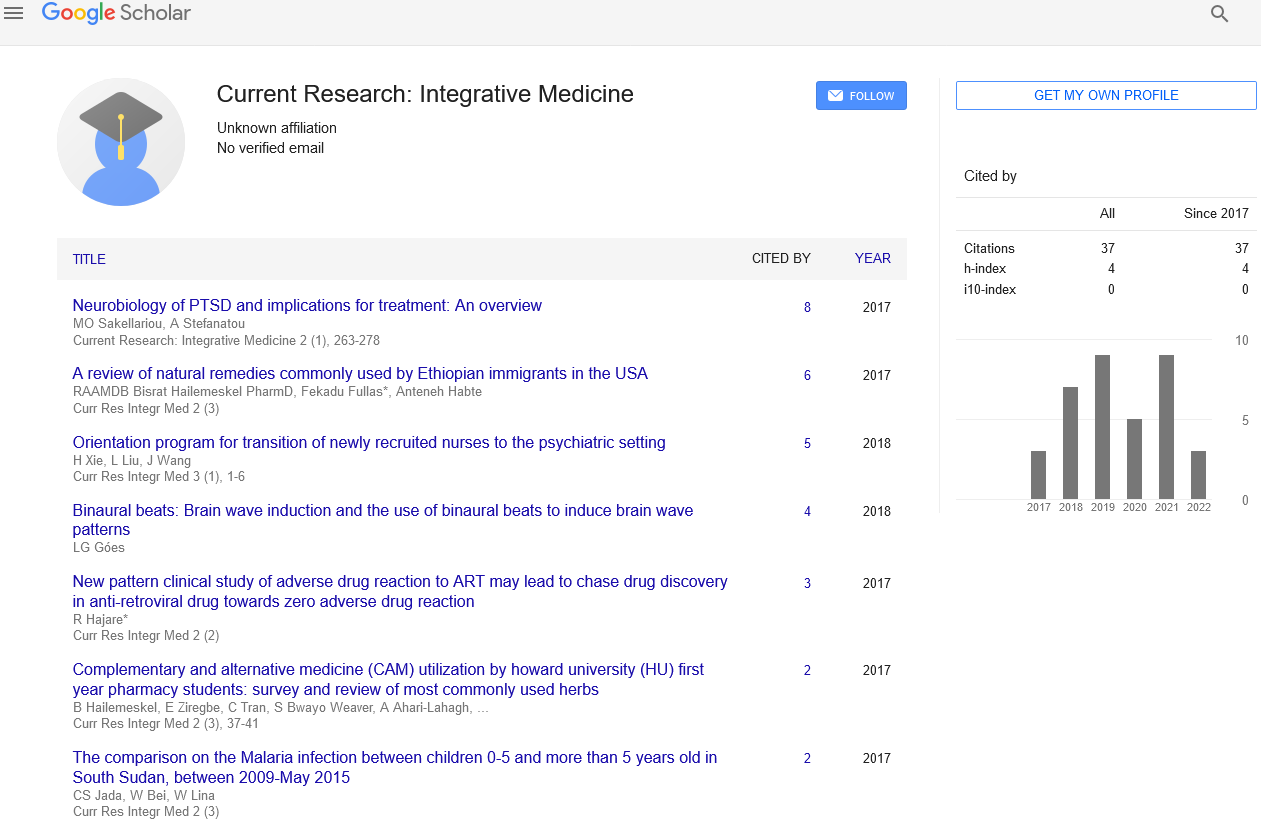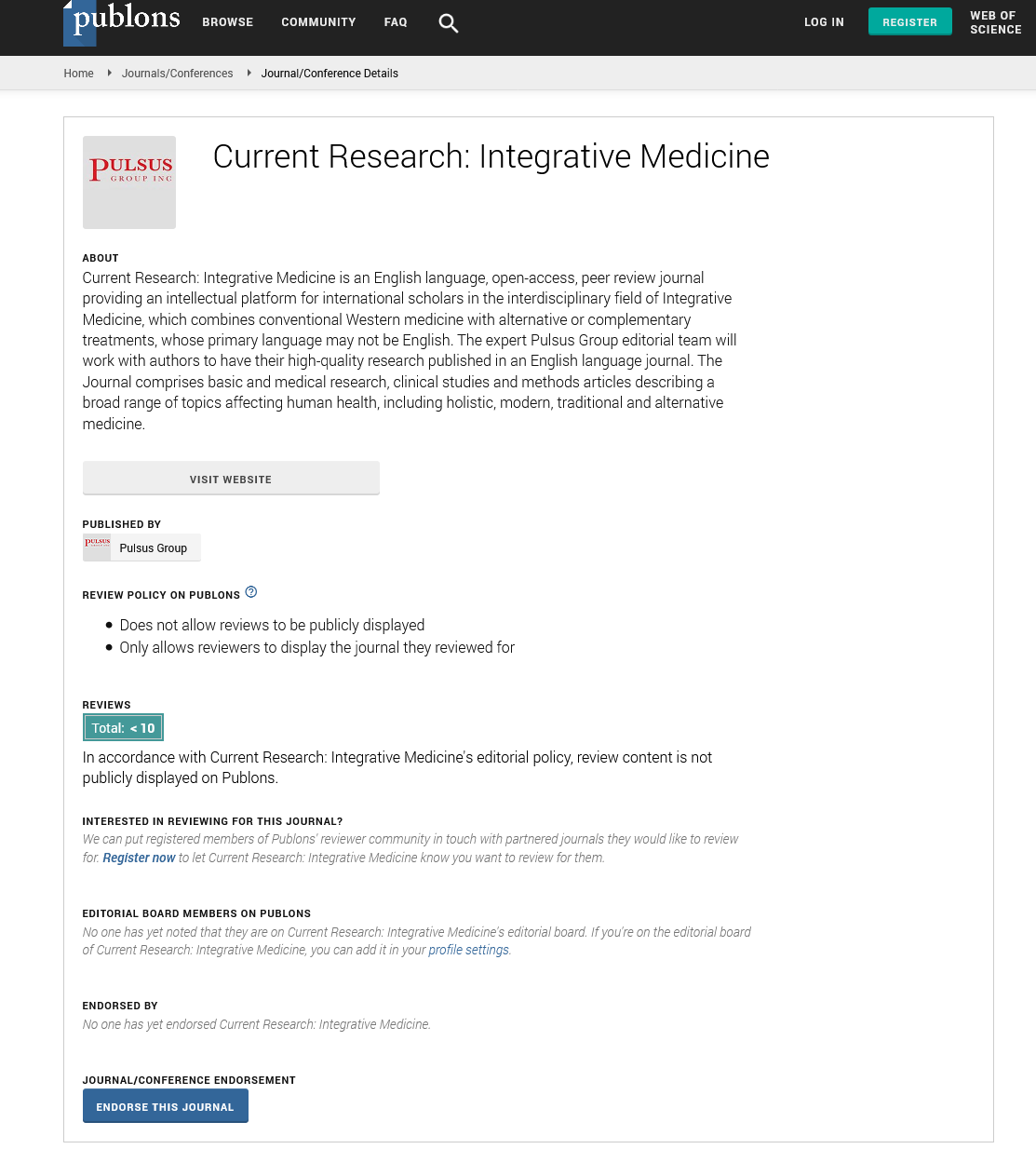Nutrition and dietary therapy: A holistic approach to health and well-being
Received: 15-Jul-2024, Manuscript No. pulcrim-24-7112; Editor assigned: 17-Jul-2024, Pre QC No. pulcrim-24-7112(PQ); Accepted Date: Jul 22, 2024; Reviewed: 17-Jul-2024 QC No. pulcrim-24-7112(Q); Revised: 20-Jul-2024, Manuscript No. pulcrim-24-7112(R); Published: 25-Jul-2024
This open-access article is distributed under the terms of the Creative Commons Attribution Non-Commercial License (CC BY-NC) (http://creativecommons.org/licenses/by-nc/4.0/), which permits reuse, distribution and reproduction of the article, provided that the original work is properly cited and the reuse is restricted to noncommercial purposes. For commercial reuse, contact reprints@pulsus.com
Abstract
Nutrition and dietary therapy play a pivotal role in maintaining and enhancing health, preventing chronic diseases, and managing various health conditions. This article explores the principles of nutrition and dietary therapy, highlighting their significance in promoting overall well-being. It examines the foundational aspects of balanced nutrition, the therapeutic potential of specific dietary interventions, and the emerging trends in personalized nutrition. Through an analysis of recent research and practical applications, this communication aims to provide a comprehensive understanding of how dietary choices impact health outcomes and offer practical guidelines for implementing effective dietary strategies.
Key Words
Nutrition; Dietary therapy; Health; Chronic disease; Personalized nutrition
Introduction
In an era where lifestyle-related diseases are on the rise, the importance of nutrition and dietary therapy cannot be overstated. Proper nutrition is fundamental to human health, influencing physical, mental, and emotional well-being. Dietary therapy, a branch of nutritional science, involves the use of specific dietary practices to prevent, manage, or treat various health conditions. This holistic approach to health emphasizes the therapeutic potential of food and nutrients in achieving optimal health outcomes.
The role of balanced nutrition
Balanced nutrition is the cornerstone of good health. It involves consuming a variety of foods in the right proportions to provide the body with essential nutrients, including carbohydrates, proteins, fats, vitamins, and minerals. A well-balanced diet supports the body's physiological functions, enhances immune response, and reduces the risk of chronic diseases such as obesity, diabetes, cardiovascular diseases, and certain cancers [1].
Therapeutic dietary interventions
Dietary therapy employs specific dietary patterns and nutrients to address health issues. Some of the most common therapeutic diets include:
Mediterranean diet: Rich in fruits, vegetables, whole grains, lean proteins, and healthy fats (mainly from olive oil), this diet has been shown to reduce the risk of heart disease, stroke, and certain cancers. It also promotes longevity and cognitive health.
DASH diet: The Dietary Approaches to Stop Hypertension (DASH) diet focuses on reducing sodium intake and increasing the consumption of potassium-rich foods. It is effective in lowering blood pressure and preventing cardiovascular diseases.
Low-carb diets: Diets low in carbohydrates, such as the ketogenic diet, are used to manage weight and control blood sugar levels in individuals with diabetes. They may also have benefits for metabolic syndrome and neurological disorders.
Plant-based diets: Emphasizing plant foods such as fruits, vegetables, legumes, nuts, and seeds, these diets are associated with a lower risk of chronic diseases, improved weight management, and enhanced environmental sustainability [2].
Emerging trends in personalized nutrition
Personalized nutrition is an evolving field that tailors dietary recommendations to an individual's genetic makeup, microbiome, lifestyle, and health status. Advances in nutrigenomics and nutrigenetics have made it possible to customize diets based on genetic predispositions and metabolic responses. This approach holds promise for optimizing health and preventing diseases at an individual level [3].
Practical guidelines for implementing dietary therapy
Implementing dietary therapy involves several practical steps:
Assessment: A thorough assessment of an individual's dietary habits, health status, and nutritional needs is essential. This can be achieved through dietary surveys, blood tests, and genetic analysis.
Goal setting: Establishing clear, achievable health goals based on the assessment results. Goals may include weight loss, blood sugar control, improved heart health, or enhanced mental well-being.
Personalized plan: Developing a tailored dietary plan that aligns with the individual's preferences, lifestyle, and health goals. This plan should be flexible and adaptable to changes in the individual's health status.
Education and support: Providing education on the benefits of dietary therapy and practical tips for making healthier food choices. Continuous support from healthcare professionals, dietitians, and nutritionists is crucial for sustained adherence to the dietary plan.
Monitoring and adjustment: Regular monitoring of progress and adjusting the dietary plan as needed to ensure optimal health outcomes. This may involve periodic reassessments and modifications based on the individual's response to the dietary interventions [4].
Conclusion
Nutrition and dietary therapy offer a powerful means to enhance health and prevent disease. By adopting balanced nutrition and personalized dietary interventions, individuals can achieve significant improvements in their overall well-being. As research continues to uncover the intricate connections between diet and health, the role of nutrition in medical practice is likely to expand, providing more effective and tailored solutions for a wide range of health conditions.
References
- Mastorakou D, Rabaeus M, Salen P, et al. Mediterranean diet: a health-protective dietary pattern for modern times InAnalysis Nutr. Res. 2019;7(7) 233-58. Academic Press.
- Paoli A, Rubini A, Volek JS, et al. Beyond weight loss: a review of the therapeutic uses of very-low-carbohydrate (ketogenic) diets. Eur. J. Clin. Nutr. 2013;67(8):789-96.
- Tuso PJ, Ismail MH, Ha BP, et al. Nutritional update for physicians: plant-based diets. Perm. J.2013;17(2):61.
- Ordovas JM, Mooser V. Nutrigenomics and nutrigenetics. Curr. Opin. Lipidol.s 2004;15(2):101-8.






